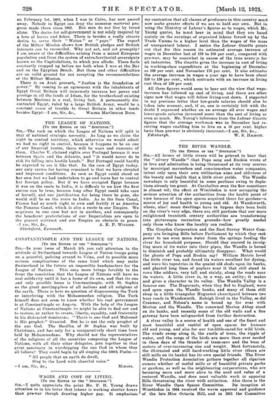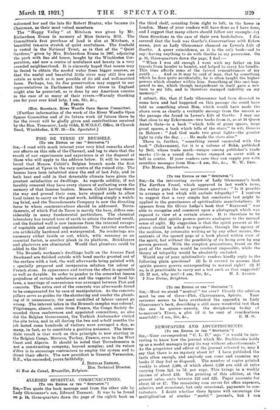THE RIVER WANDLE.
(To THE EDITOR or THE " SPEcTAToa.") Sts,—All lovers of little rivers will be grieved to hear that the "silvery Wandle".that Pope sang and Ruskin wrote of in love and admiration is being threatened at its very sources by municipal marauders and conscienceless water companies, intent only upon their own utilitarian aims and oblivious of the beauty and health that a Mt% riser yields. The Wandle nowadays is only beautiful in some portions owing to deple- tions already too great. At Carshalton even the flow sometimes is almost nil; the effect at Wimbledon is now occupying the serious attention of the authorities from the health point of view because of the open spaces acquired there for gardens—a source of joy and health to young and old. At Wandsworth, where, alas! mean dwellings have in bygone days been built on the river's very edge, there are still portions that our more enlightened twentieth century authorities are transforming into picturesque recreation grounds—how greatly needed only those who know the locality can realize.
The Croydon Corporation and the East Surrey Water Com- pany are bringing Bills before Parliament by which they seek power to use even more water from the springs feeding the river for household purposes. Should they succeed in inveig- ling more of its water into their pipes, the Wandle is bound to diminish and probably ultimately disappear. What would the ghosts of Pope and Ruskin say? William Morris loved the little river too, and found its waters excellent for dyeing, and wove his tapestries in the quaint old sheds upon its banks, and planted long lines of poplars near it that still stand in rows like soldiers, very tall and stately, along the roads near its waters. A little river is, in a way, an entity; it makes and gives a character to its valley. The Wandle Valley is a famous one. The Huguenots, when they fled to England, wove and spun upon the Wandle banks, and many of them still sleep in a little triangular Huguenot churchyard between two busy roads in Wandsworth. Raleigh lived in the Valley, so did Cranmer, and Nelson's name is bound up for ever with Merton and the Wandle. The renowned Merton Abbey stood on its banks, and recently some of the old walls and a fine gateway have been safeguarded from further destruction.
A river valley is a source of health and one of the finest and most beautiful and restful of open spaces for humans old and young, and also for our too-little-cared-for wild birds. The winds sweep along it, the rustle of trees, the ripple of water, and the songs of the birds are more than ever needed in these days of the thunder of tram-cars and the buzz of motors of ever-increasing size and weight. Most fortunately, the ill-treated and still hard-working little river (there are still mills on its banks) has its own special friends. The River Wandle Protection Association gathers together all riparian owners whether of useful mills or of beautiful private parks or gardens, as well as the neighbouring corporations, who are becoming more and more alive to the need and value of a restored Wandle, and does most valuable work in opposing Bills threatening the river with extinction. Also there is the River Wandle Open Spaces Committee. Its inception at Wimbledon in 1904 received the warm approval and guidance of the late Miss Octavia Hill, and in 1911 the Committee welcomed her and the late Sir Robert Hunter, who became its Chairman, as their most valued members.
The "Happy Valley" at -Mitcham was given by. Mr. Richardson Evans in memory of Miss Octavia Hill. The Committee's first purchase of land is also at Mitcham, a beautiful ten-acre stretch of quiet restfulness. The freehold is vested in the National Trust, as is that of the " Quiet Gardens," given by Mrs. Richardson Evans in 1907, adjoining the park with fine old house, bought by the Wimbledon Cor- poration, and now a centre of usefulness and beauty in a very crowded neighbourhood. It is sincerely hoped that means may be found to obtain the needed water from bigger sources, so that the useful and beautiful little river may still live and retain as much as is now possible of its old and well-merited fame. Perhaps, too, its due preservation may suggest to our representatives in Parliament that other rivers in England might also be protected, as is done by our American cousins in the case of so many of their rivers.—Warmly thanking you for your ever kind help, I am, Sir, &c.,
M. Nam; (Hon. Secretary, River Wandle Open Spaces Committee).
[Further information of the work of the River Wandle Open Spaces Committee and of its future work (if future there be for the river) will be gladly given and contributions received by the Hon. Treasurer, Lady Gibb, R.W.O.S.C. Office, 10 Church Road, Wimbledon, S.W. 19.—ED. Spectator.]



































 Previous page
Previous page